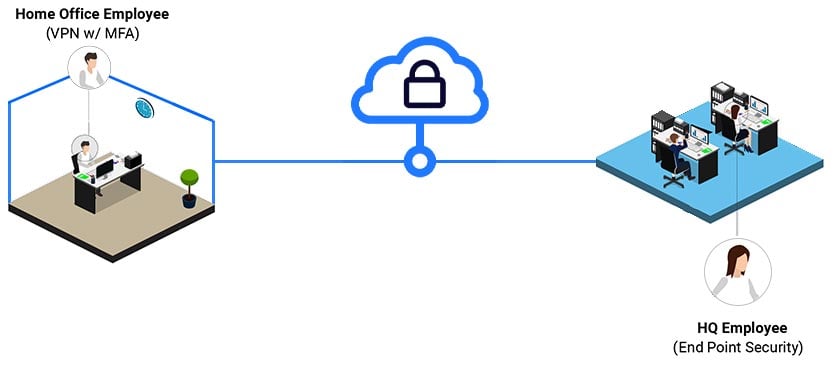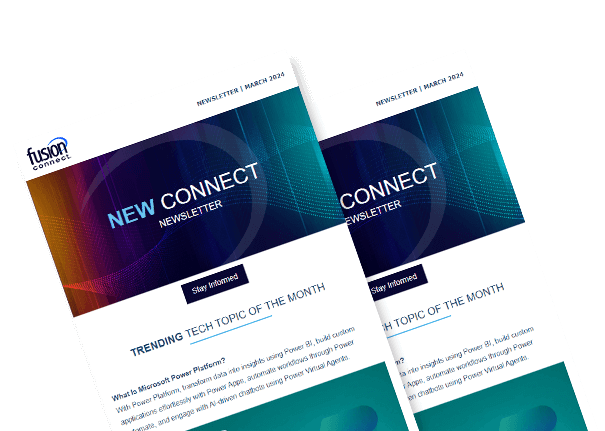What is Remote VPN Access with MFA?
Secure access to your private networks with multi-factor authentication for remote workforces.
Posted on October 10, 2022 by Fusion Connect
A remote VPN (Virtual Private Network) gives remote workers access to your network from anywhere, but you must ensure it’s secure, using everything from MFA to Zero Trust.
In the U.S., 58% of job holders say they can work remotely at least part of the time, according to McKinsey, and 87% would take the opportunity if it was offered. After the pandemic drove many workers from the office to working from home, virtual private networks spiked in popularity as organizations sought a way to keep workers productive while safeguarding their corporate networks.
A VPN protects your business while supporting your workforce. With more workers than ever logging on from home, during business travel, and seemingly everywhere but the office, VPNs allow users to securely log on to your network wherever they may be, as long as they have an internet connection. Once authenticated, users have full access to email, internal applications, data, and more, just as if they were working out of your headquarters.
VPNs use powerful encryption technology to certify the connection is safe and any data exchanged between your network and a remote device remains secure. But just as important is making sure the user accessing the VPN is who they say they are. One way to do this is with multi-factor authentication (MFA), which requires users to submit a second form of authentication in addition to a password, such as a code delivered via an app or text message, or perhaps biometrics. This is a piece of a larger Zero Trust approach to security.
Top Five Benefits of MFA & VPN
If you have any employees working remotely, a VPN is one of the foundational technologies you need to stay secure. Ensuring MFA and other authentication technology is activated ensures the VPN can do its job better. When evaluating VPNs, consider the following:
#5 MFA & VPN Benefit
Efficient Management and Billing
When selecting a VPN, consider working with a provider that offers other security and networking services, from Advanced Edge Security to SD-WAN. By working with a provider with a broad set of services, you can consolidate your bill and management of your account while improving security.
#4 MFA & VPN Benefit
Any Location, Any Device
VPNs work from any location, creating a secure tunnel into your network while requiring users to authenticate themselves through MFA and other means. Given the rise of remote work and as more employees work outside of the office, the ability to connect to data and applications on your network from anywhere becomes essential to productivity.
#3 MFA & VPN Benefit
Synchronize Users
Using a cloud directory, you can synchronize users from multiple directories such as Workday, Active Directory, LDAP, G Suite, and others, to keep all your employees on the same page no matter where they’re working from.
#2 MFA & VPN Benefit
Secure Connections
Encrypting all traffic through the VPN allows remote users secure access to company resources, and with added authentication, through MFA and Zero Trust principles, you can confirm that only authorized users have access.
#1 MFA & VPN Benefit
Remote Productivity
Ultimately the most important benefit of a VPN is the remote access it grants. When you give employees the ability to work from anywhere with the same resources as if they were working in the office, you can maximize productivity without any decrease in security. Even as the network perimeter becomes hazy as remote and hybrid work becomes more common, you can ensure access and security with a VPN.
MFA & VPN
The Technology and People
Building a Secure Path
Remote access VPNs establish a secure tunnel between your network and an end-user device. Using powerful encryption protocols, VPNs allow remote users to access applications and data on your internal network over the public internet while ensuring your data remains secure during the transfer.
Key to the effectiveness of a VPN is user authentication. While the secure tunnel a VPN establishes between a device and your network keeps data secure, you need to confirm the users logging in are who they say they are and only have the permissions they need. Compromised credentials are a common entry point for bad actors, who can quickly gain a foothold and begin to move laterally through your network, executing ransomware attacks, data breaches, or worse.
MFA is key to authenticating users of your VPN. When a user logs in with their password, they’ll need to provide an additional assurance that they are who they say they are. It might be a code sent to their phone, a key fob with a code that continually changes, or even a biometric scan. There are various forms of MFA, but they all work to confirm the identity of the user logging in.
This is one piece of a Zero Trust approach to security, in which users are assumed to be bad actors until proven otherwise. Rather than the traditional “trust but verify” approach taken by many organizations, Zero Trust requires not only that users authenticate themselves but continue to verify that they are who they say they are as they try to access new resources or as the time window for their access expires. Zero Trust operates under the principle of least privilege to ensure users can only access what is necessary for them to do their jobs.
MFA & VPN for an Enterprise Business
VPNs were an invaluable tool during the COVID-19 pandemic when remote work soared. Businesses suddenly required their employees working mostly, or primarily, from home. They needed a secure way for employees to easily and efficiently access their usual office resources.
Of course, VPNs are not a new technology. But they saw a renewed surge of interest during the pandemic that highlights many of their benefits in enabling secure remote work.
As hybrid and remote work continues, organizations need an established and secure way to provide their employees the tools and data they need to best execute their jobs.
VPNs make the process of connecting to your network simple for users. It ensures adoption of the VPN which keeps all communications and data transfers secure. VPNs allow users to securely log in from wherever they are. Whether that’s a home Wi-Fi network or the Wi-Fi in a coffee shop, airplane, hotel, beach, or somewhere else - without compromising your organization’s security standards.
At the same time, VPNs offer top notch encryption to certify everything passing through the tunnel from an end user’s laptop, phone, or tablet to your network remains off limits to anyone who lacks proper access.

What Is Remote VPN Access with MFA?
The Conclusion
No matter how many users you have who work remotely -- or whether they split their time between home and the office or travel for business -- all of them benefit from a remote access VPN. Users work as if they’re in the office with the same level of access and security. Multi-factor authentication (or, similar authentication methods) ensure users are who they say they are.
While the pandemic brought renewed attention to VPNs, enterprises have an ongoing need for this technology. Adding a remote VPN as part of a larger suite of IT services, such as SD-WAN or Edge Security, gives your enterprise the secure access you need. Adding to a larger set of IT and security services, allows you to consolidate billing and make management of your entire technology stack simpler and more efficient.
Using technology to offer secure remote access keeps your employees more productive and connected while never compromising to protect your most valuable business assets.
A Managed Service Provider (MSP) with a standalone MFA and VPN Service.
MSPs offer the most advanced and secure VPNs on the market. They work with thousands of companies to manage IT, connectivity, security, and more, and understand the needs of the enterprise. By offering a VPN, MSPs can better serve your business. Solving the challenges and ensuring their customers are not only secure, but productive. Knowing the needs of the client and their space, MSPs can implement a VPN with MFA and other protocols in place to enable secure remote access.


